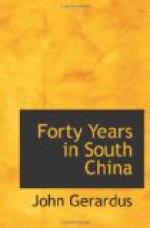“Further, Mr. President, it is to be remembered that we are acting for all time. It is not this one case that is before us. We are settling a precedent which is to last for generations. Relax your constitutions and laws for this irregularity and you open a gap through which a coach and four may be driven. Every other mission, under the least pretext, will come and claim the same or a similar modification in their case, and you cannot consistently deny them. The result will be an ecclesiastical chaos throughout our entire missionary field. Let us begin as we mean to hold out. Let us settle this question now and settle it aright. We direct our missionaries what Gospel to preach, what sacraments to administer, what internal organization to give to single churches. Let us, in the same manner and for the same reasons, say what sort of bonds shall unite these churches to each other and govern their mutual relations and common interests.
“I know we are told that the hybrid organization which now exists is every way sufficient and satisfactory; that it is the fruit of Christian love, and that to disturb it would be rending the body of Christ. Here one might ask how it came to exist at all, seeing that this Synod spoke so plainly and unambiguously in 1857. And I for one cordially concur in the remark of the Elder Schieffelin, that the brethren there ‘deserve censure.’ We do not censure them, nor do we propose to do so, but that they deserve it is undeniable. But the point is, how can our disapproval of the mongrel Classis mar the peace of the Amoy brethren? There is already a division among their churches. Some are supported by our funds, others by the funds of the English Presbyterians. Would it alter matters much to say, and to make it a fact, that some of those churches belong to a Classis and others to a Presbytery? Some have an American connection and others an English. But this would break Christian unity! Would it, indeed? You observed, Mr. President, the affectionate confidence, blended with reverence, with which I addressed from the chair the venerable Dr. Skinner. The reason was that we both belong to an association of ministers in New York which meets weekly for mutual fellowship, enjoyment, and edification in all things bearing on ministerial character and duties. Ecclesiastically we have no connection whatever. I never saw his Presbytery in session, and I doubt if he ever saw our Classis; yet our brotherly, Christian, and even ministerial communion is as tender, and sacred, and profitable as if we had been copresbyters for twenty years. Now, who dare say that this shall not exist at Amoy? Our brethren there can maintain precisely the same love, and confidence, and co-operation as they do now, in all respects save the one of regular, formal, ecclesiastical organization.




